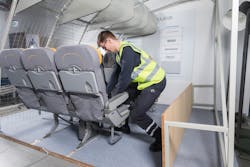Hamburg Airport's Efforts to Improve the Health of Ground Handlers
While safety is crucial across the aviation industry, some inherent risk remains. For example, ground handling agents like baggage handlers can suffer from musculoskeletal disorders (MSDs) from repetitive tasks like working in cramped locations and lifting heavy items.
Data from the European Agency for Safety and Heath at Work (EU-OSHA) indicates MSDs become more common as workers age. What’s more, current social trends indicate that the average age of workers at German airports is increasing. In fact, it is predicted that the average age of employees across German airports in 2024 will be 54 years old.
To address MSDs and the issues they create for ground handling personnel, Hamburg Airport (HAM) worked with social security agents in Germany, including BG Verkehr, to develop a program intended to prevent and rehabilitate work-related injuries through personalized instruction as well as occupational training and exercise.
The Project
The goal of this project was primarily designed to prevent accidents and injuries. According to data collected, back problems accounted for more than 20 percent of time-off requests from ground handlers.
Leadership at HAM had attempted to find solutions for employees to avoid injuries such has providing gym memberships and offering training and fitness advice. But despite these incentives, airport officials didn’t achieve the desired results. Ultimately, it was determined that people were more likely to adopt better fitness goals if it was part of their daily work activities.
The project's leaders worked with approximately 850 airport employees made up of two groups – those most at risk of developing MSDs and a second group who were not faced with enough challenges for their musculoskeletal systems.
The first group was comprised primarily of baggage handlers, who regularly lifted heavy items, and aircraft cleaners, who often find themselves working in difficult ergonomic positions. The second group included HAM’s bus and truck driving staff, who face longer stretches of inactivity.
The goal of the project was to reduce requested time off by ground service personnel caused by musculoskeletal disorders. To accomplish this, project leaders worked to optimize the way ground handlers performed tasks in the short term and then make those changes to work habits sustainable for the long term. To aid this effort, a training center was created to improve endurance and force training and to provide a job simulation environment to enhance work training.
Among the initiatives of this project was an 18-month program called “Remember Me, Your Back.” Designed to promote improved back health, the program yielded successful results, so organizers extended and expanded the project to include additional airport employees.
To track results, the new project required all staff to undergo a physical prior to beginning. Ground handling agents were also given individual instruction to help them address their own unique objectives and advice for approaching their training.
The training package included cardiovascular and strength exercises as well as work simulation duties to improve practical techniques for daily tasks such as lifting and transferring baggage unto a belt loader.
The job simulator replicated the daily challenges ramp workers face, including working positions, lifting requirements and more. As employees used the simulator, they received feedback and other advice on how to perform their duties safely.
What set this project apart from other fitness initiatives was the fact that training and gym time occurred during normal work hours. Training was built into the daily schedule, taking into account peaks and valleys in the HAM’s flight traffic.
Additionally, the program allowed employees to learn from health experts and get feedback while working on the job.
Results
The University of Applied Sciences, located in Hamburg, was tasked with evaluating the program’s effectiveness. Ultimately, the report found that improvements in work behavior and movements had been sustainable months after the project began.
Ground personnel were still attending fitness and strength training sessions and improved techniques were still being utilized.
Businesses were seeing the desired effects as well, as costs sustained by time-off requests dropped significantly and provided a robust return on investment. After BG Verkehr ended is direct involvement with the project in 2020, the airport continued with it. And since the initial pilot, the program has expanded to other industries such as nurses and caregivers.
Summary
In addition to the positive results mentioned previously, the program also highlighted the mutual benefits of improved health for both individual employees and businesses.
For example, one employee shared his experience with the program and noted improvements in his diet, weight and personality. He also pointed out an improved relationship with his employer, which has led to increased motivation at work. In an industry where employee retention is becoming increasingly important, developing that type of employee-employer relationship is crucial.
Helge Homman is head of the aviation section within the department of prevention at BG Verkehr. Located in Hamburg, Germany, BG Verkehr provides statutory accident insurance for the transport, postal logistics and telecommunications industries in Germany. The company advises more than 210,000 member companies on prevention and provides treatment, rehabilitation and compensation for its insured after work accidents and occupational diseases.
About the Author

Helge Homann
Helge Homman is head of the aviation section within the department of prevention at BG Verkehr. Located in Hamburg, Germany, BG Verkehr provides statutory accident insurance for the transport, postal logistics and telecommunications industries in Germany. The company advises more than 210,000 member companies on prevention and provides treatment, rehabilitation and compensation for its insured after work accidents and occupational diseases.
